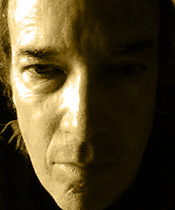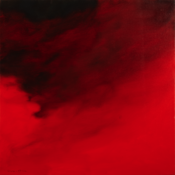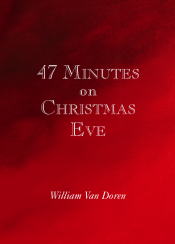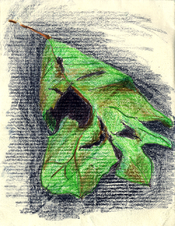 William Theodore Van Doren. Stony Point, Albemarle County, Va. Oil on paper, 16 x 20.
William Theodore Van Doren. Stony Point, Albemarle County, Va. Oil on paper, 16 x 20.
This is what they call ‘Mostly Cloudy’.
Sometimes I wonder what Thoreau would have done, or how he might have done, if he’d been in the position of issuing blog postings every day from Walden Pond. I mean, wouldn’t there have been quite a few days when he would have been unable to think of anything more to say than “Jesus, it’s cold!” or “Harvested 3 bu. beans ... swam across pond ... listened to bullfrogs”?
Henry David strikes me as the deliberative sort, probably not the easiest or most fluid of writers. He wrote about half of Walden while he was living at the pond, between 1845 and 1847, but then went through seven drafts before publishing the book in 1854. As you probably know, it was a failure, commercially.
But I do wonder also if it might not have helped Thoreau to have the kind of daily imperative to communicate that many of us feel today. Thoreau took time to distill and compress, and in a sense elevate, his experiences into the book so many have come to know. But he also said, after Walden was published:
Is not the poet bound to write his own biography? Is there any other work for him but a good journal? We do not wish to know how his imaginary hero, but how he, the actual hero, lived from day to day.
I am happy to know that Thoreau could write this even as he was sitting in a house filled with unsold books. But speaking for myself, I know that if I’m a hero, it’s only in my own mind, and so I am strictly my own imaginary hero. And I find that learning how to write a ‘good journal’, and particularly to both write and publish in real time, can be extremely challenging. Those who can do it – hello again, Stephen Fry, Andrew Sullivan, James D. Griffioen, among others – these may be poetic heroes for our time.
 William Theodore Van Doren. Sunset from Stony Point, Albemarle County, Va. Oil on watercolor block, 16 x 20.
William Theodore Van Doren. Sunset from Stony Point, Albemarle County, Va. Oil on watercolor block, 16 x 20. BVD
BVD
 BVD
BVD
 Friday, March 5, 2010 at 07:20PM | by
Friday, March 5, 2010 at 07:20PM | by  BVD | in
BVD | in  Sunset Paintings,
Sunset Paintings,  Sunsetology | tagged
Sunsetology | tagged  Blue Ridge,
Blue Ridge,  Henry David Thoreau | | Comments Off
Henry David Thoreau | | Comments Off 











Tweets Illustrated: The Woodpile